动词和动词词组
动词和动词短语

动词和动词短语1.接不定式(不接动名词>作宾语的24个常用动词afford(买得起;有能力做>,agree(同意>,arrange(安排>,ask(要求;让>,beg(请求>,fail(失败>,choose(选择>,decide(决定>,demand(要求>,determine(决定>,expect(期待>,fear(害怕>,help(帮助>,hope(希望>,learn(学习>,manage(设法>,offer(提出>,plan(计划>,prepare(准备>,pretend(假装>,promise(许诺>,refuse(拒绝>,want(想要>,wish(希望>NqFaLH4sHkIt is a very important exam so I can’t afford to fail it.NqFaLH4sHk这是非常重要的考试,我不可以失败。
My neighbour offered to help me when I was in trouble.NqFaLH4sHk当我困难时,邻居主动提出帮我忙。
2.接动名词(不接不定式>作宾语的28个常用动词admit(承认>,advise(建议>,allow(允许>,appreciate(感激>,avoid(避免>,consider(考虑>,delay(推迟>,deny(否认>,dislike(不喜欢>,enjoy(喜欢>,escape(逃避>,fancy(想象>,finish(完成>,forbid(禁止>,stand(忍受>,imagine(想象>,keep(继续>,mention(提到>,mind(介意>,miss(错过>,permit(允许>,practise(练习>,prohibit(禁止>,report(报道>,risk(冒险>,stop(停止>,suggest(建议>,understand(理解>NqFaLH4sHkI really appreciate working with someone who does such a good job.NqFaLH4sHk我非常乐意与工作如此出色的人共事。
高考常见的动词词组动词词组

1. 动词+aboutcare about 对…在乎come about 发生(vi)bring about 引起,使发生hear about 听说set about doing 着手,开始做think about 思考worry about 为…担心2. 动词+ ataim at 目的是call at 拜访(地点)come atglance at 匆匆一瞥glare at 怒视laugh at 嘲笑knock at 敲(门,窗)point at 指向run at 冲向shoot at 向…射击shout at 冲某人嚷嚷smile at 冲某人微笑stare at 凝视tear at 用力撕wonder at 惊讶work at3. 动词+awayblow away 吹走carry away 拿走,使入迷clear away 消除掉,消散give away 背弃,泄漏pass away 过世put away 收拾起来;存起来take away 拿走throw away 扔掉wash away 冲走4. 动词+backcall back 回电话give back 归还hold back 控制住;踌躇;阻止…发展keep back 隐瞒;忍住;扣下(钱)look back 回顾take back 拿回,收回5. 动词+downbreak down 坏了;垮了;失灵;分解;克服(某种情绪)bring down 使…降低;使...倒下burn down 烧毁come down 下落,传下来calm down 平静下来cut down 消减;坎倒pass down 传下来settle down 安家;安静下来slow down 慢下来take down 记下tear down 拆毁,拆除turn down 调小,拒绝6. 动词+foranswer for 对…负责apply for 申请ask for 要求得到beg for 乞求call for 要求;需要change…for…用…来换charge …for…收费;要价care for 关心;喜欢hunt for 寻找hope/ wish for 希望long for 渴望look for 寻找pay for 为…付钱run for 竞选search for 查找stand for 代表,表示take… for 误以为…是…wait for 等待7. 动词+fromdate from 始于…(=date back to)differ from 与…不同die from 因…而死hear from 收到某人来信keep/ prevent/ stop …from doing阻止learn from 向…学习result from 由于separate… from 把…分离开suffer from 受…苦8. 动词+inbreak in 强行进入;插话bring in 引进;赚得call in 召集;来访cut in 插入drop in 拜访fill in 填写get in 进入;收获give in 让步,投降hand in 上交join in 参加(活动)look in 来访,参观persist in 坚持result in 导致succeed in 成功take in 吸收;理解;欺骗9. 动词+intoburst into 闯入;迸发change ….into…把…变成…divide…into…把…分成…look into 研究;调查put/ translate…into…翻译run into 碰到turn into 变成10. 动词+ofapprove of 赞成complaim of 抱怨consist of 组成die of 死于dream of 梦到hear of 听说rob sb. of 抢劫某人某物speak of 谈到talk of 谈到think of 想到11. 动词+offbreak off 打断carry off 带走cut off 切断;断绝fall off 跌落,掉下get off 脱下;下车give off 散发出go off 走开,消失,坏掉keep off 避开;勿走进knock off 把…撞落leave off 中断,停下pay off 还清put off 延期,推迟see off 送行set off 出发,上路show off 炫耀start off 出发take off 脱下;起飞;腾飞;模仿turn off 关掉;turn sb off 使某人厌烦12. 动词+onbring on 使…发展carry on 继续,进行call on 拜访call on sb to do 号召某人去做congratulation to sb on sth祝贺depend on 依靠feed on 以…为生go on 继续,进行insist on 坚持have on 穿着keep on 继续look on 旁观live on 以…为生move on 继续移动,向前走operate on 给…做手术pass on 传受,传递put on 穿上,戴上,上演rely on 依靠spend…on sth/ in doing 在某方面花钱take on 雇佣;呈现;承担(任务)try on 试穿turn/ switch on 打开work on 从事13. 动词+outbreak out 爆发bring out 阐明burst out 迸发carry out 执行come out 出来;出版;开花drop out 辍学;退出figure out 算出find out 查处give out 散发;分发;用完;劳累go out 熄灭hand out 散发help out 救助hold out 伸出;坚持下去leave out 省略,删掉let out 泄漏,发出(声音)look out 小心keep out 使…不进入make out 理解,看清楚pick out 选出point out 指出put out 扑灭run out 被用完run out of 把…用完set out 出发;开始做to dosend out 发出;派遣speak out 大胆讲出try out 使用,试验turn out 结果是;生产wear out 突破;使…疲劳work out 算出;制定;运行结果;锻炼14. 动词+overget over 克服;恢复go over 复习;审查,研究fall over 跌倒,摔倒look over 翻阅;检查roll over 翻滚run over 看一遍,压死take over 接管think over 仔细考虑turn over 翻倒;细想15. 动词+toadd to 增添add….to…把…增添到…agree to 同意attend to 照料belong to 属于come to 共计;苏醒compare …to…与…相比devote to 致力于get to 到达happen to 发生lead to 导致listen to 听object to 反对point to 指向refer to 谈到;涉及到;参阅reply to 答复see to 处理,照料stick/ hold/ keep to 坚持supply… to 为..提供turn to 查阅;向…求助write to 给某人写信16. 动词+upbreak up 分解,解散bring up 抚养build up 建立catch up with 赶上clear up 整理,收拾;放晴come up 上来;出现cut up 切碎do up 整理,包装eat up 吃完end up 结束fix up 修理;安排,装置get up 起床,站起give up 放弃,停止go up 增长,上涨grow up 成长hurry up 赶快keep up 保持hold up 耽搁,使停顿lay up 积蓄look up 查找,找出make up 组成;编造;铺(床);和好open up 开创pick up 拾起;学会;接某人;接受put up 搭起;住宿;张贴ring up 打电话send up 发射set up 架起;建立sit up 熬夜speed up 加速stay up 熬夜take up 开始做;从事;继续;占据tear up 撕碎throw up 吐turn up 调大;出席,出现use up用完17. 动词+withagree with同意begin with以…开始combine with结合compare…with…对比cover with覆盖deal with处理do with处理end with以…结束equip …with…装备fill with装满play with玩耍provide sb with sth提供provide sth for sb meet with遇到,遭受share with分享supply sb with sth提供supply sth to sb talk with和某人谈话18. 动词+throughget through通过;完成;接通电话go through审查,检查live through经历look through翻阅,仔细察看pull through渡过危机see through识破动词+名次+介词catch sight of 瞧见,看见catch/ take hold of 抓住devote oneself to 致力于do harm to 对…有危害do wrong to 冤枉,委屈feel/ have/ take pity for 同情fix one’s eyes on 凝视form the habit of 养成习惯get in touch of 联系上get rid of 去除give advice on 提出建议have trust in 相信have (no)difficulty in (没)有困难have a word with 同某人谈话have words with 和某人争吵have a look at 看have/ show/ feel/ (an)interest in对某物感兴趣have effect on 对…有影响have mercy on 同情怜悯have the honor of 有…的荣幸help oneself to自便keep in touch with 保持联系make friends with 交朋友make fun of 取笑make good/ full use of 利用make (the) best use of 充分利用make an apology to 道歉make a fool of 愚弄make one’s way to 走向make preparations for 为.. 做准备make room for 为…留地方pay a visit to 访问pay attention to 注意put one’s heart to 全神贯注于set fire to=set sth on fire 点火show respect for 尊敬say hello/ goodbye to 打招呼/道别set an example to 树立榜样shake hands with 握手take aim at 瞄准take charge of 负责管理take the side of 支持take pride in 因…而自豪take part in 参加take a photo of 照相take a message for 捎个口信take care of照顾take notice of注意take the place of代替throw light on 阐明动词+副词/形容词+介词add up to 总计为break away from 脱离,挣脱be up to 应由…轮到…cut down on 消减catch up with 赶上come up to 达到(标准)come up against 遭到(反对,困难)do well in 做得好do away with 废除drop in on/ at 拜访人/地face up to 面对,承担fit in with 适合,符合get down to 开始认真做get close to 接近get into the habit of养成习惯get used to 习惯get on/ along with 进展,相处get out of 从…出来,摆脱go on with 继续go back on 背信,背弃go in for 参加,爱好keep away from 远离keep up with 跟上live up to 不辜负look/ watch out for 小心look back upon 回顾look forward to 期待look up to 尊敬look down upon 轻视make up for 弥补put up with 忍受think highly of 高度评价work hard at 努力于动词+介词+名词arrive at/ come to aconclusion得出结论burst into pieces 成为碎片burst into laughter/ tears 突然大笑/大哭come into use 开始使用come into power 当权coem into being 产生do up one’s hair 梳理头发get in a word 插话make up one’s mind 下决心。
动词和动词词组

知识结构网状态:b e持续:keep, last ,remain ,stay, lie,stand似乎:seem,appear感官:look,smell,taste,feel,sound系动词变成:become,grow,go,get,turn,come,fall,run证明:prove,turn out1帮助现在分词构成现在进行时2帮助过去分词构成被动语态Be 3帮助不定式构成beto do结构,表示将来,命令,征求意见,约定等。
1帮助实义动词构成疑问句,否定句助动词 do 2帮助实义动词原型构成强调式3用来代替动词按用法 have帮助过去分词构成完成时态分shall/will/would/should帮助谓语动词构成将来时态宾语及物动词双宾语复合宾语实义动词不及物动词动词情态动词延续性动词:last;keep按意义分动词和非延续性动词:die,leave,come动词词组动词+介词:look at; take on动词+副词:find out ,turn up动词词组动词+副词+介词:come up with, go in for动词+名词+介词:take part in ,take care ofBe+形容词+介词:be ready for ,be devoted to 考点一:动词及动词辨析1,achieve,gain,win,earn(1),achieve,vt. 强调通过极大努力获得或达到某事物,实现弯沉,常与一些抽象名词连用,如:success,goal(2),gain vt 指获得,赢得(尤指想要的或所需的事物)。
此外,gain 还有增加的意思 I gained the impression that the matter had been settled The plane rapidly gained height. Gain weight= put on weight(3),win vt 表示在较强的竞争中取得胜利,它通常跟的宾语有game,war ,prize, fame, battle(4),earn vt. 表示挣钱,赚工资,因自己成就行为等,得到应得的事物,博得,earn one’s living 谋生2,adapt, adjust, adopt(1),adapt 使适合,使适应 adapt (oneself)to …使自己适应。
高考复习动词和动词短语

A your cell phone when 8. Terry, please _____ Grandma is talking to you. (安徽2014) A. look up from B. look into C. look back on D. look through 9. Shakespeare’s writing is still popular B the test of today. It has really _____ time. (安徽2014) A. failed B. stood C. taken D. conducted
2. 动词短语辨析。主要包括同根动词短语 的辨析、同根介词或副词的动词短语的 辨析、 不同动词构成的动词短语的辨析 以及“动词+副词+介词”短语的辨析。 在动词词组的测试中,绝大多数为基础 动词,出现频率较高的词有:get, turn, make, put, go, give, break, cut, come, look, keep, bring, show, pick, hold, fall, carry, pull, catch, call, take等。
4. As a grassroots singer, she reads everything she can _____ B concerning music, and takes every opportunity to improve herself. (福建2014) A. catch sight of B. get hold of C. take charge of D. make mention of
Ralph W. Emerson would always _____ D new ideas that occurred to him. (陕西2014) A. set off B. set about C. set up D. set down
高中英语语法-动词及动词词组
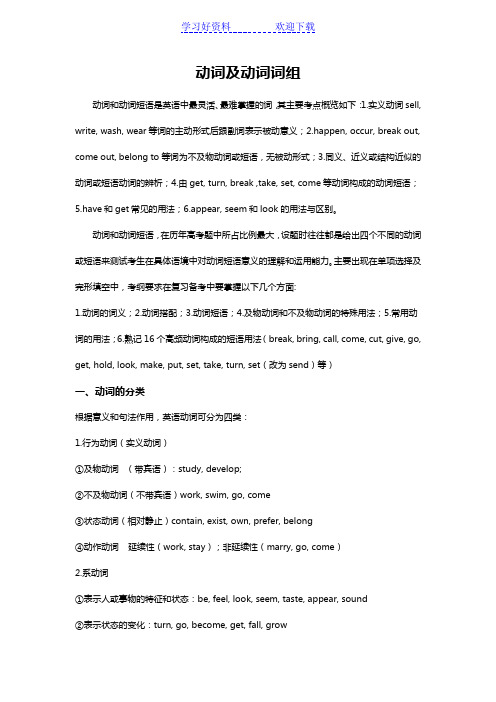
动词及动词词组动词和动词短语是英语中最灵活、最难掌握的词,其主要考点概览如下:1.实义动词sell, write, wash, wear等词的主动形式后跟副词表示被动意义;2.happen, occur, break out, come out, belong to等词为不及物动词或短语,无被动形式;3.同义、近义或结构近似的动词或短语动词的辨析;4.由get, turn, break ,take, set, come等动词构成的动词短语;5.have和get常见的用法;6.appear, seem和look的用法与区别。
动词和动词短语,在历年高考题中所占比例最大,设题时往往都是给出四个不同的动词或短语来测试考生在具体语境中对动词短语意义的理解和运用能力。
主要出现在单项选择及完形填空中,考纲要求在复习备考中要掌握以下几个方面:1.动词的词义;2.动词搭配;3.动词短语;4.及物动词和不及物动词的特殊用法;5.常用动词的用法;6.熟记16个高频动词构成的短语用法(break, bring, call, come, cut, give, go, get, hold, look, make, put, set, take, turn, set(改为send)等)一、动词的分类根据意义和句法作用,英语动词可分为四类:1.行为动词(实义动词)①及物动词(带宾语):study, develop;②不及物动词(不带宾语)work, swim, go, come③状态动词(相对静止)contain, exist, own, prefer, belong④动作动词延续性(work, stay);非延续性(marry, go, come)2.系动词①表示人或事物的特征和状态:be, feel, look, seem, taste, appear, sound②表示状态的变化:turn, go, become, get, fall, grow③表示某种状态的延续或持续:remain, keep, stay3.助动词(与动词原形或分词构成复合谓语):be(am,is,are),do(does,did);have(has);will,would,shall4.情态动词:can(could),may(might),must,shall(should)二、动词及动词短语(一)动词词义辨析动词是是各类考试的重点,高考试题中,单项填空、完形填空和改错等三项题型中,动词辨义的比重较大,并逐年增加。
动词和动词词组 ppt课件

My wife doesn’t know Russian
Do you agree with me?
2.do用来加强语气,起强调作用 You do look well
3.do用作代词 ---Do you like Beijing? ---Yes,I do (do代替like Beijing)
Examples: 1. It may snow before nightfall.
2. Would you let me use your pen for a minute?
3.If she became a movie star, she could afford a new home.
注意:情态动词过去时形式并不一定就表示过去时间 情态动词不能叠加使用,其后接的是动词原形
第10讲
动词和动词词组
动词分类(一)
1,按其在动词词组中所起的作用分:主动词和助动词
{主动词: 又叫实义动词,能独立作句子谓语成分 简单动词词组 复杂动词词组 基本助动词:be,do,have
{ 助动词
情态助动词 can,could,may,might,will,would,shall,should,need, must,dare,dared,ought to,used to
半助动词:have to,seem to,be about to,be due to, be going to ,be meant to,be meant to,be supposed to等.
Examples: 1.The workers received a raise last year.
2.They have been taking music lessons.
词组类型举例

词组类型举例摘要:1.词组类型简介2.常见词组分类与举例3.词组在英语学习中的应用4.如何提高词组运用能力5.总结正文:【1】词组类型简介在英语中,词组(Phrase)是由两个或多个词组成的语言单位,具有一定的语法和语义功能。
词组可以分为多种类型,如动词词组、名词词组、形容词词组等。
下面我们将简要介绍几种常见的词组类型。
【2】常见词组分类与举例1.动词词组:动词词组是指由动词和其宾语、补语等构成的词组。
例如:eat breakfast(吃早餐)、have a chat(聊天)、do some shopping(购物)等。
2.名词词组:名词词组是由名词和其修饰语组成的词组。
例如:a small gift(一个小礼物)、an interesting book(一本有趣的书)、the beautiful scenery(美丽的风景)等。
3.形容词词组:形容词词组是由形容词和其修饰语或被修饰的名词组成的词组。
例如:a tall man(一个高个子男人)、an attractive proposal(一个有吸引力的提议)、a difficult problem(一个困难的问题)等。
4.介词词组:介词词组是由介词和其宾语组成的词组。
例如:on the table(在桌子上)、in the box(在盒子里)、behind the door(在门后面)等。
5.副词词组:副词词组是由副词和其修饰的动词、形容词等组成的词组。
例如:quickly(快速地)、carefully(小心地)、happily(开心地)等。
【3】词组在英语学习中的应用词组在英语学习中起着重要作用,掌握丰富的词组有助于提高口语、听力、阅读和写作能力。
在学习过程中,我们要注意积累各种类型的词组,并学会在实际语境中灵活运用。
【4】如何提高词组运用能力1.多读:阅读英语文章、书籍、报纸等,积累各种类型的词组。
2.多听:收听英语广播、观看英语电影和电视剧,模仿母语使用者的发音、语调和语速。
英语语法复习:动词及动词短语
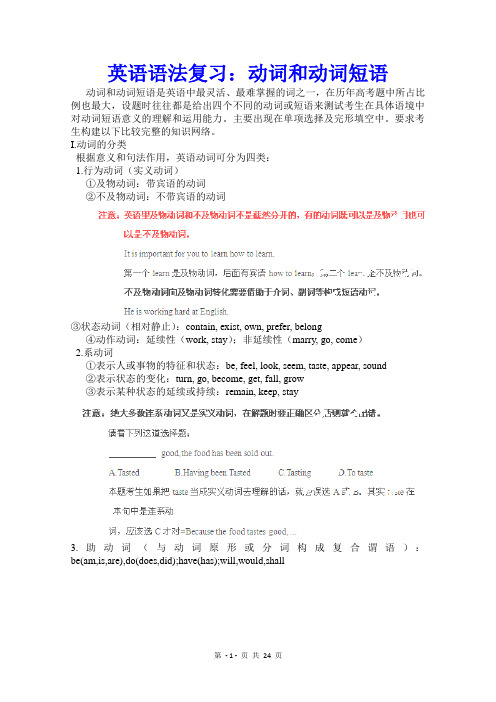
英语语法复习:动词和动词短语动词和动词短语是英语中最灵活、最难掌握的词之一,在历年高考题中所占比例也最大,设题时往往都是给出四个不同的动词或短语来测试考生在具体语境中对动词短语意义的理解和运用能力。
主要出现在单项选择及完形填空中。
要求考生构建以下比较完整的知识网络。
I.动词的分类根据意义和句法作用,英语动词可分为四类:1.行为动词(实义动词)①及物动词:带宾语的动词②不及物动词:不带宾语的动词③状态动词(相对静止):contain, exist, own, prefer, belong④动作动词:延续性(work, stay);非延续性(marry, go, come)2.系动词①表示人或事物的特征和状态:be, feel, look, seem, taste, appear, sound②表示状态的变化:turn, go, become, get, fall, grow③表示某种状态的延续或持续:remain, keep, stay3.助动词(与动词原形或分词构成复合谓语):be(am,is,are),do(does,did);have(has);will,would,shall4.情态动词:can(could),may(might),must,shall(should)等等She turned off all the lights which had been left on. 她关掉了所有还在亮着的灯。
②如果宾语是人称代词,只能放在动词和副词之间。
She gave them away.她送掉了它们。
③同一动词和不同副词搭配时,意义上有很大的差异。
ring back回电话, ring off挂断电话, ring up打电话put away放好, put on穿,上演, put up挂起,举起。
2.动词+介词(及物)I'm looking for my glasses.我在找我的眼镜。
高考英语词法系列:动词和动词短语
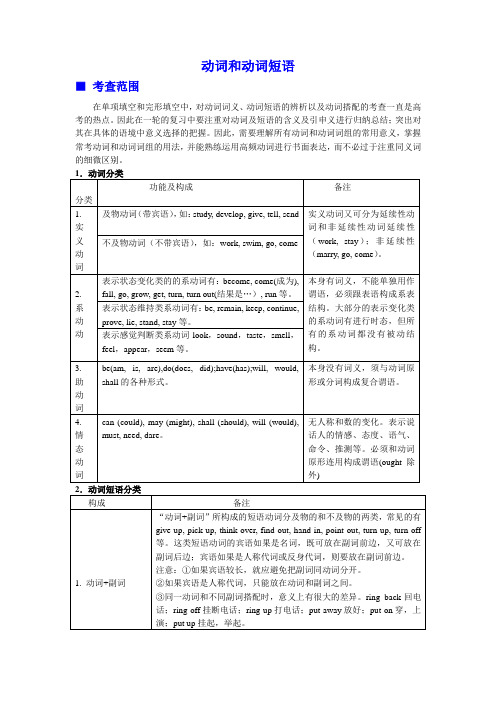
动词和动词短语■考查范围在单项填空和完形填空中,对动词词义、动词短语的辨析以及动词搭配的考查一直是高考的热点。
因此在一轮的复习中要注重对动词及短语的含义及引申义进行归纳总结;突出对其在具体的语境中意义选择的把握。
因此,需要理解所有动词和动词词组的常用意义,掌握常考动词和动词词组的用法,并能熟练运用高频动词进行书面表达,而不必过于注重同义词的细微区别。
■高频考点高考对动词的考查重点集中在实义动词的常见意义和用法,而对助动词的考查较少。
对动词短语的考查重点是第1~3项,而考查第4~6项的情况较少。
高考试题分析■真题探究1.(2010安徽)No matter how low you consider yourself, there is always someone ______you wishing they were that highA. getting rid ofB. getting along withC. Looking up toD. looking down upon【答案与解析】C getting rid of意为“摆脱;去除”;getting along with意为“与……相处;进展”;Looking up to意为“尊敬;敬仰”;looking down upon意为“看不起;轻视”。
句意为“你无论认为自己怎样低下, 总希望有个高尚的人来尊敬你。
”2. (2010全国Ⅰ)The workers ______ the glasses and marked on each box “ This Side Up”A. carriedB. deliveredC. pressedD. packed【答案与解析】D 句意:工人们把玻璃制品包装好并且每个盒子上标记上“此面向上”。
选项为四个意思上毫无关联的动词, 此题考查动词的词义辨析。
carry 译为搬运, deliver译为递送, press译为按, 压, pack译为打包。
动词与动词短语

第四讲动词和动词短语考点一动词的分类1,及物动词:可直接加宾语。
如:do, hate, like, marry, say, tell.2,不及物动词:加适当的介词后再加宾语。
如:come, go, arrive3,助动词:have (has, had),do (did, does)4,可接双宾语的动词如: show, buy, sell, offer, make, teach, award等,其用法为:1,动词+间宾(人)+直宾(物)buy me a book.2,动词+直宾+for(为)+间宾buy a book for me.3,动词+直宾+to(方向)+间宾show the book to me.5, 系动词:be (am, is, are, was, were)除be动词外,还有些动词可以用作连系动词,它们不能单独作谓语,必须与表语(多为形容词)一起构成合成谓语。
【对点演练】一. 单句语法填空,根据汉语提示完成句子。
1.You know how I ____(讨厌)math.2.He _________(进入)the room and shut the door.3.Do you ____(助动词)something to eat?4.He is saving up to buy a house ____(介词) his family.5.He ___(系动词) staying with friends this weekend.答案:1 hate 2came into 3have 4for 5is二. 单句语法改错1.Now I like to the film some.2.Will you go us? Sure!3.Love me as I love you?4.Do not expect him to show kindness for you.5.I will brain you if you don't keep quietly.答案:1去掉to 2 go后面加with 3Love前面加Do,且Love改love 4for改to 5quietly改quiet考点二动词辨析1. 重点掌握某些近义词的辨析如:admit, allow, permit; contain, include; receive, accept; want, wish, hope, expect; stay, remain, keep; discover, uncover等。
高中英语语法过关辅导课件-动词和动词词组

She went through the book before buying it. She went over the lessons for three times. He had to go without food. The ship is heading for the nearest port. He is looking up a new word in the dictionary. The boy looked through the picture book. She put up a picture on the wall. The match is put off owing to the rain. The bus ran over his legs. His illness results from overeating. Overeating results in his illness.
You will answer for what you’ve done. The boy asked for more food. He doesn’t care for playing football. I came across an old friend in the street.
call up打电话
到进一步发展,不能与名词purpose搭配使用。obtain“获得,得
到”,多指获得信息、知识、忠告、许可等,不能与purpose搭配。 reach“达到,达成”,在此最具迷惑性,但reach多与conclusion,
decision, agreement, destination等名词搭配,不能与purpose搭配。
sth.“因某事而控告某人”。blame“责备,责怪”,常与介词for
语法精讲(五) 动词及动词短语

语法精讲(五)动词及动词短语考情分析扬帆起程的导航灯近五年的江苏高考单项填空中都考查到动词及动词短语,考查的形式为动词词义辨析和动词短语的辨析,因此可把动词归为高考的重点知识。
考生对于动词及动词短语这一块知识的失分最主要的原因在于词汇量不足以及对词义辨析不清,其次就是对上下文语境理解有误。
考点聚焦疑难点津的北斗星考点1 动词的词义辨析lay与lieaccuse与charge二者皆为“指控,控告”,搭配不同,另外charge是法律上正式用语。
accuse sb. of sth.; charge sb. with sth.match, fit 与suitmatch vi. & vt. 表品质、颜色、设计等方面匹配,表示“与……相配,和……一致”。
fit vi. & vt. 多指衣物等大小合身,合适。
suit 表适合,强调衣物的颜色、式样、质地等适合某人,也指合乎需要、口味、性格、条件等。
persuade与advisepersuade 说服 persuade sb. to do sth./persuade sb. into doing sth.advise 建议 advise doing sth./advise sb. to do sth.speak,say,talk与tellspeak vi. & vt. 讲 speak English/speak well of sb./sth.say vt. 说 say sth./It says...talk vi. 谈 talk to sb. about/of sth.tell vt. 告诉;区别 tell sb. sth. /tell the truth or a lie/tell...from...wear,put on, dress 与have on都指穿衣,但have on, wear表状态;put on表动作;dress 既表状态又表动作,且不跟衣物作宾语: dress sb./oneself 或be dressed in a suitborrow,lend 与keepborrow 借进;lend借出,两者皆为短暂动词,不能与一段时间连用,表示借多久都用keep。
动词和动词词组全解

• 助动词的语法功能是协助主动词表示不同的语 法意义或情态意义,比如表示某一动作正在进 行或已经完成,应该做某事或不应该做某事。 • 英语的助动词分为三类:基本主动词、情态助 动词和半助动词。 • a)基本助动词 • 基本助动词只有3个:be, do, have。作为助动 词,be, do, have本身没有词汇意义,只在动 词词组中起语法作用。比如助动词be通常用来 协助主动词构成进行体或被动态: • I am listening to a Beethoven symphony. • The students were praised by the principal.
• c) 半助动词 • 半助动词指某些兼有主动词和助动词特征的 语法结构,比如have to, seem to之类的结构 既可与主动词搭配构成复杂动词词组并表示 情态意义,从而像是情态助动词。 • I have to buy a new car. • 又能与其他助动词搭配,像是主动词。、 You will have to sell your house. He didn't seem to love her.
• • • • • • • • •
过去进行体(past progressive): She was playing the piano this time yesterday. 现在完成体(Present perfective): She has played the piano for half an hour. 过去完成体(Past perfective): 现在进行完成体(Present perfective progressive) She has been playing the piano for a long time. 过去完成进行体(Past perfective progressive) By 10 o'clock she had been playing the piano for two hours.
【译林版】四上英语小学英语动词、词组归纳

【译林版】四上英语小学英语动词、词组归纳【译林版】四上英语小学英语动词、词组归纳动词可以说是英语中最重要的部分之一,它们用于描述动作、状态、感觉等等。
在四上的英语学习中,学生会接触到许多常用的动词和词组。
这里将梳理一些重要的动词和词组,以帮助学生更好地学习和理解英语。
一、动作动词1. go(去)I go to school by bus every day.我每天坐公交车去上学。
2. come(来)Please come to my house for dinner.请来我家吃晚饭。
3. see(看见)I can see a bird in the tree.我能在树上看见一只鸟。
4. hear(听见)Can you hear the music?你能听到音乐吗?5. listen(听)Listen to the teacher carefully.仔细听老师的讲话。
6. watch(看)I like to watch movies on the weekend.我喜欢在周末看电影。
7. play(玩、打)She likes to play with her friends after school. 她放学后喜欢和朋友们玩。
8. do(做)I have a lot of homework to do.我有很多作业要做。
9. make(制作)My mom makes delicious cookies.我妈妈做的饼干很好吃。
10. eat(吃)I usually eat breakfast at 8 o'clock.我通常在8点吃早饭。
11. drink(喝)He drinks milk every morning.他每天早上喝牛奶。
12. write(写)I can write my name in English.我会用英语写我的名字。
13. read(读)She loves to read books.她喜欢读书。
动词和动词短语

3 一、动词的类别
精讲
精练
动词包括四类:实义动词、情态动词、助动词、系动词, 其中 除实义动词外, 其余的几类都得和动词或其他词一起构成谓语
2. 系动词
系动词有一定的词义, 但不完整, 必须和作表语的形容词、 名词、介词短语、副词及非谓语动词一起连用。如以上3、 4小题。 系动词分为两类: 一类表示状态或存在,
精讲
精练
5. in
(2) 包围, 关闭(to be surrounded, or enclosed)
close in 包围, 封闭
lock in 禁闭
shut in 关进
wall in 围住
26/85
3 二、动词短语
精讲
精练
5. in
(3) 加入, 记入(to be added, or included)
1/85
精讲
精练
动词是英语中最重要的词汇, 是英语句子中心, 因此掌握动 词是学好英语的关键。
2/85
3 一、动词的类别
精讲
精练
动词包括四类:实义动词、情态动词、助动词、系动词, 其中除 实义动词外, 其余的几类都得和动词或其他词一起构成谓语。
1. 实义动词
实义动词又称行为动词, 是具有实实在在意义能单独作谓 语的动词。 实义动词分为及物动词和不及物动词。 及物动词后需带宾语意义才完整, 如:buy, catch, invent, like, say等。 不及物动词后不需或不能接宾语, 如:live, agree, look, listen, come, rise等。
tire / wear out 筋疲力尽
29/85
3 二、动词短语
精讲
精练
初中英语常见动词及动词词组
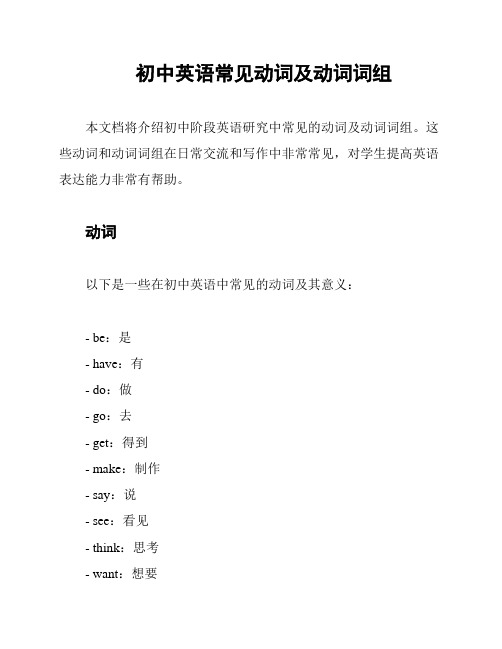
初中英语常见动词及动词词组
本文档将介绍初中阶段英语研究中常见的动词及动词词组。
这些动词和动词词组在日常交流和写作中非常常见,对学生提高英语表达能力非常有帮助。
动词
以下是一些在初中英语中常见的动词及其意义:
- be:是
- have:有
- do:做
- go:去
- get:得到
- make:制作
- say:说
- see:看见
- think:思考
- want:想要
- like:喜欢- love:爱
- enjoy:享受- study:研究- play:玩耍- eat:吃
- drink:喝
- wear:穿戴- sleep:睡觉- run:跑
- walk:走
- listen:听- speak:说话- read:阅读- write:写
- draw:画图- sing:唱歌- dance:跳舞
动词词组
以下是一些常用的初中英语动词词组:
- go to school:去上学
- get up:起床
- go to bed:去睡觉
- have breakfast:吃早餐
- have lunch:吃午餐
- have dinner:吃晚餐
- do homework:做作业
- play sports:进行体育运动
- watch TV:看电视
- listen to music:听音乐
- speak English:说英语
- read books:读书
- write essays:写作文
希望以上内容对您的英语学习有所帮助。
加油!。
动词及动词词组考点透析
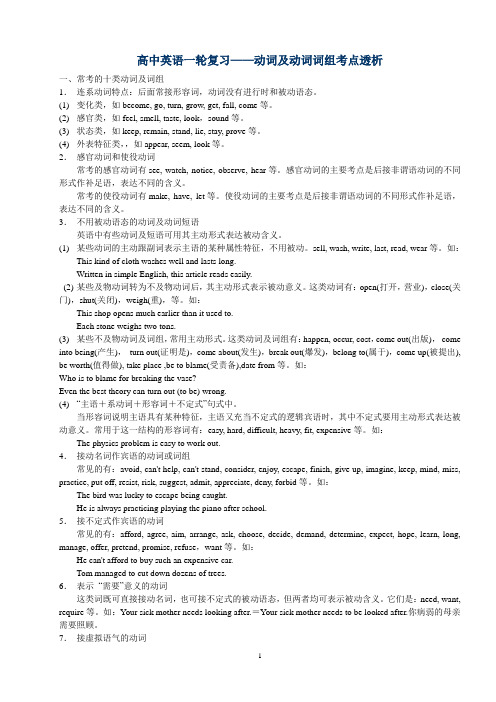
高中英语一轮复习——动词及动词词组考点透析一、常考的十类动词及词组1.连系动词特点:后面常接形容词,动词没有进行时和被动语态。
(1) 变化类,如become, go, turn, grow, get, fall, come等。
(2) 感官类,如feel, smell, taste, look,sound等。
(3) 状态类,如keep, remain, stand, lie, stay, prove等。
(4) 外表特征类,,如appear, seem, look等。
2.感官动词和使役动词常考的感官动词有see, watch, notice, observe, hear等。
感官动词的主要考点是后接非谓语动词的不同形式作补足语,表达不同的含义。
常考的使役动词有make, have, let等。
使役动词的主要考点是后接非谓语动词的不同形式作补足语,表达不同的含义。
3.不用被动语态的动词及动词短语英语中有些动词及短语可用其主动形式表达被动含义。
(1) 某些动词的主动跟副词表示主语的某种属性特征,不用被动。
sell, wash, write, last, read, wear等。
如:This kind of cloth washes well and lasts long.Written in simple English, this article reads easily.(2) 某些及物动词转为不及物动词后,其主动形式表示被动意义。
这类动词有:open(打开,营业),close(关门),shut(关闭),weigh(重),等。
如:This shop opens much earlier than it used to.Each stone weighs two tons.(3) 某些不及物动词及词组,常用主动形式。
这类动词及词组有:happen, occur, cost,come out(出版),come into being(产生),turn out(证明是),come about(发生),break out(爆发),belong to(属于),come up(被提出), be worth(值得做), take place ,be to blame(受责备),date from等。
动词及动词短语

动词及动词短语概述动词(verb)一般就是用来表示动作或状态的词。
动词一般在句中担任谓语的成分一实意动词:能独立做谓语的动词就是实意动词。
主要包括及物动词和不及物动词。
1.及物动词—Transitive Verb (vt)本身意义不完整,需要接宾语才能使其意义完整。
seat , injure ,accept , finish , cover, defeat, put, give, post, sell, buy ,consider, advise, hear…..例句:It is hard to change ourselves.2.不及物动词—Intransitive Verb(vi)本身意义完整,不需要接宾语,如需加宾语,通常先加介词再加宾语。
Listen, look,Come , go , arrive , sit , swim, cry, stand , run ,fail, happen, take place, break out , occur, come true,exist…改错:1)Look the blackboard! 2)I like listening music. 3)3.系动词:连接主语和表语的动词。
特点:它本身有词义,但不能单独做谓语,后面须跟表语一起构成复合谓语。
表示主语的身份(I am a teacher.),类别(It is a book),特征(She is beautiful)和状态( The door is open)等。
分三类:1)表示一个特征或状态:be , taste, look , feel , sound, seem, appearHe looks very happy. The food tastes delicious2)表示变成某种状态:make , turn , get, come , grow, run , prove , become ,turn out , goThe leaves turn yellow in autumn.It becomes colder and colder3)表示保持某种状态:keep, remain , continue, lie ,stayStaycalm when you are in danger.当你处于危险的时候保持冷静。
《动词和动词词组》课件

THANKS
祈使语气
祈使语气用于表达命令、请求或建议 ,通常用于祈使句。
祈使语气也可以通过动词的否定形式 来表达,如“Don't forget to close the door!”(别忘了关门!)
祈使语气通常使用动词原形,如 “Open the door!”(开门!)
使用祈使语气时要注意礼貌和尊重, 避免使用过于强硬或命令式的表达方 式。
动词+副词词组
总结词
表示动作的方式或时间
详细描述
这类词组通常由动词和副词组成,如“run fast”、“eat slowly”、“come here”、“go there”等,表示动 作的方式或时间。例如,“run fast”表示快速地跑,“eat slowly”表示慢慢地吃,“come here”表示到这里 来,“go there”表示到那里去。
03 动词的时态
现在时态
定义
表示当前时刻或现阶段正在进行的动作或存在的状态。
形式
基本形式、进行体、完成体。
用法
描述当前正在发生的事情,计划或安排要执行的动作,以及表示习 惯、反复发生的动作。
过去时态
定义
表示过去某个时间点发生的动作或存 在的状态。
形式
用法
描述过去已经发生的事情,过去某个 时间正在进行的动作,以及表示过去 的计划或安排。
3
示例
The book was written by him. (这本书是他写 的。)
05 动词的语气
陈述语气
陈述语气用于表达事实、观点 或描述,没有特殊的语调或情 感色彩。
陈述语气通常用于陈述句,如 “The sun rises in the east.”(太阳从东方升起。)
小学英语常见动词及动词词组

小学英语常见动词及动词词组swim游泳fly飞jump跳walk走run跑sleep睡觉drink water喝水get up起床go to bed起床go home回家go to school去上学go swimming去游泳go fishing去钓鱼go shopping买东西go hiking去远足go skiing滑雪go skating滑旱冰go ice-skating滑冰play sports做运动play ping-pong打乒乓play football踢足球play the piano弹钢琴play chess 下棋play computer games玩电脑游戏play the violin拉小提琴listen to music听音乐watch TV看电视read a book看书write a letter写信write an e-mail写邮件write a report写报告take pictures拍照片sing and dance唱歌跳舞draw pictures 画画fly kites 放风筝watch insects观察昆虫make a kite 做风筝pick up leaves摘树叶do an experiment做实验catch butterflies抓蝴蝶count insects数昆虫collect stamps收集邮票climb a mountain爬山row a boat 划船take a trip 旅游do housework做家务clean the room打扫房间cook dinner做晚饭make the bed铺床wash clothes洗衣服do the dishes洗碗sweep the floor扫地set the table放桌子answer the phone接电话water the flowers浇花empty the trash倒垃圾have a picnic野餐do homework做家庭作业eat breakfast吃早餐do morning exercises晨练have an English class上英语课plant trees种树visit grandparents看望爷爷奶奶make a snowman堆雪人ride a bike骑车。
- 1、下载文档前请自行甄别文档内容的完整性,平台不提供额外的编辑、内容补充、找答案等附加服务。
- 2、"仅部分预览"的文档,不可在线预览部分如存在完整性等问题,可反馈申请退款(可完整预览的文档不适用该条件!)。
- 3、如文档侵犯您的权益,请联系客服反馈,我们会尽快为您处理(人工客服工作时间:9:00-18:30)。
The city will become rich. 2. 状态变化 get, turn, become, fall, The milk turned sour. grow The baby fell asleep / ill. People who ate them often got ill.
3. 被感觉的状态 (涉及感官的系动词) 4. 感觉到的状态 feel That sounds interesting. The wall behind looks a bit gray and dull. The boy feels sorry for that. Mother feel proud of her job. The Englishman feels used to living here.
It took more than ten years to build the house. It took great imagination as well as patience for Annie to teach me to speak.
双宾语结构:主语+谓语+双宾语
说明 examples 人(间宾)+物(直宾) The teacher gave us some pictures. 物(直宾)+to +人(间 The teacher gave some pictures to us. 宾) 人(间宾)+物(直宾) Father made me a paper boat. Mother bought a new dress for me. 物(直宾)+for +人 (间宾) Grandma cooked a nice meal for us. 双宾语中的that 从句 The man told the girl that he wanted to test her the subject.
6. 涉及结果状态 go , come, prove 7. seem 句型
feel sure / sorry / right / fit / lonely /angry / proud/ shy / happy 2. get late / fat/ homesick / dark/ worse/ angry / well / deaf / tired 3. go hungry, bad, lame, broken, mad, blind, sick, green, purple 4. grow worse, calm, violent, cold, old , thin, big, grey, fat , dark 5. keep calm, fine, quiet, fit , cool, well, warm, happy , clear 6. look strong, tired, fit , nervous, friendly, pretty, excellent 7. remain single, unmarried, calm , open, active, silent, lean 8. prove false, correct, incorrect, easy, difficult, sound useful 9. run hot, day , wild, small , short of , cold, high , mad 10. turn yellow, grey, pale, red, chilly , cold
双宾语中的what +不定 式结构
系动词
完全系动词: 后只能跟表语 be, (seem) 半系动词: 后跟表语作系动词; 后跟宾语或状语作实义动词 look, stay , keep, become, grow, turn, fall, get…
Байду номын сангаас
主系表结构
说明
1.
examples
稳定状态 be+ 表语 Mary was a clever girl . The boy was in my office. The answer is right.
双宾语中的what 从句
Mr. White asked them when he was going to give the talk. The child asked me why she had to stay there.
The doctor asked them when to operate on the child. He didn’t tell me what to do . The woman informed me where to get the ticket.
动副搭配
动介搭配
动名介搭配
宾语从句
主谓宾结构:主语+及物动词+宾语
说明 不定式作宾语 examples The child wants to have a try. The teacher agreed to give us the answer. Mother promises to give me a present. People enjoy reading humorous stories. The writer finished writing the novel. The man could risk missing the train. she likes to dance. / she likes dancing. He continued to read the newspaper. / He continued reading the newspaper. You may begin to write now. / You may begin writing now.
arise , rise , raise
arise vi.出现,发生,兴起 arose arisen arising rise vi. 上升;起身 rose , risen , rising raise vt. 举起;提高;唤起;饲养 raised , raised , raising
动词词组
动介搭配
in London. to the forest. into the hall. into at on well. well. easily. the room. the picture. their parents.
动词短语搭配
被动含义
主谓宾结构:主语+及物动词+宾语
说明 动名搭配 examples The boy broke the window. The father dug a hole in the field. I will make a note of that. Holmes thought over the problems for a few moments. The teacher worked out the problem at last. The children took off their clothes and dived. The child put the book into his bag. The woman made the cloth into a dress. They took part in the sports meeting. He paid attention to my words. My brother takes care of the vegetable garden. I shall not know whether I can get what I want. You can buy whatever you need if you have enough money.
动名词作宾语
不定式或动名词作宾 语,表达相似意义
不定式或动名词作宾 语,表达不同意义
It+及物动词+宾语+ 不定式
The old man forgot to post the letter. / ..forgot posting the letter. The child tried to find the answer. / ….tried lifting the rock.
说明 5. 保持与继续的状态 keep, continue, remain
examples Tom keeps silent. Country music today remains much the same as before. The old man continues very healthy. Her body went cold. His theory proved right. The man seems worried about his health. The teacher seemed pleased with my work. The man seems to be worried about his health. The teacher seemed to be pleased with my work. It seems that the man is worried about his health. It seemed that the teacher was pleased with my work.
+done +been doing
do (does, did)
助动词
will, shall, would, should had better used to
情态动词
主谓结构:主语+不及物动词
说明 动副搭配 主语 The teacher The child The visitor They The war The parents The Browns The children The scientist The man The girl Children The food The book The paper 谓语动词 teaches walks sat got broke gave live ran stepped broke looked depend eats reads tears 副/介词搭配+其他 成分 well. very slowly. down. up out in very early. that year. at last.
